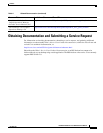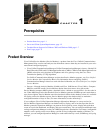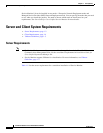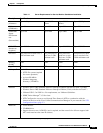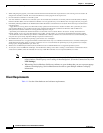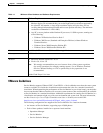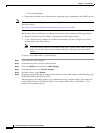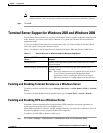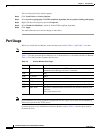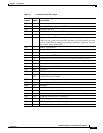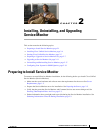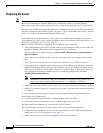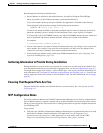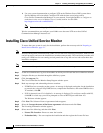
1-7
Installation Guide for Cisco Unified Service Monitor
OL-25111-01
Chapter 1 Prerequisites
Terminal Server Support for Windows 2003 and Windows 2008
Note Choosing a complex address makes it less likely that you will choose an address being used by
another customer. This can prevent accidental licensing overlap between different customers.
Step 7 Click OK.
Terminal Server Support for Windows 2003 and Windows 2008
You can install Service Monitor on a system with Terminal Services enabled in Remote Administration
mode. However, you cannot install Service Monitor on a system with Terminal Services enabled in
Application mode.
If you have enabled Terminal Services in Application mode, you should disable the Terminal Server,
reboot the system, and start the installation again.
Table 1-2 summarizes the Terminal Services features in Windows 2003 and Windows 2008 Server.
.
Enabling and Disabling Terminal Services on a Windows Server
To enable or disable Terminal Server, go to Manage Your Server > Add or Remove a Role > Terminal
Server.
To enable or disable Remote Desktop Administration, go to Control Panel > System > Remote.
Enabling and Disabling FIPS on a Windows Server
Sometimes, Federal Information Processing Standard (FIPS) compliant encryption algorithms are
enabled for Group security policy on Windows server.
When FIPS compliance is activated, the SSL authentication may fail on the Service Monitor server. To
allow Service Monitor to work properly, disable FIPS compliance.
To enable or disable FIPS on Windows 2003 server:
Step 1 Go to Start > Settings > Control Panel > Administrative tools > Local Security Policy.
Table 1-2 Terminal Services on Windows 2003 and Windows 2008 Server
Windows 2003 /Windows 2008
Server Features
Terminal Server Remote access and virtual system. Each client has its own virtual
OS environment.
Remote Desktop Administration Remote access only. All clients use the same (and the only)
operating system.
Note Do not use terminal services to perform day-to-day tasks in
Cisco Unified Communications Management Suite
applications, such as viewing the Service Level View in
Operations Manager or viewing reports in Service Monitor.



